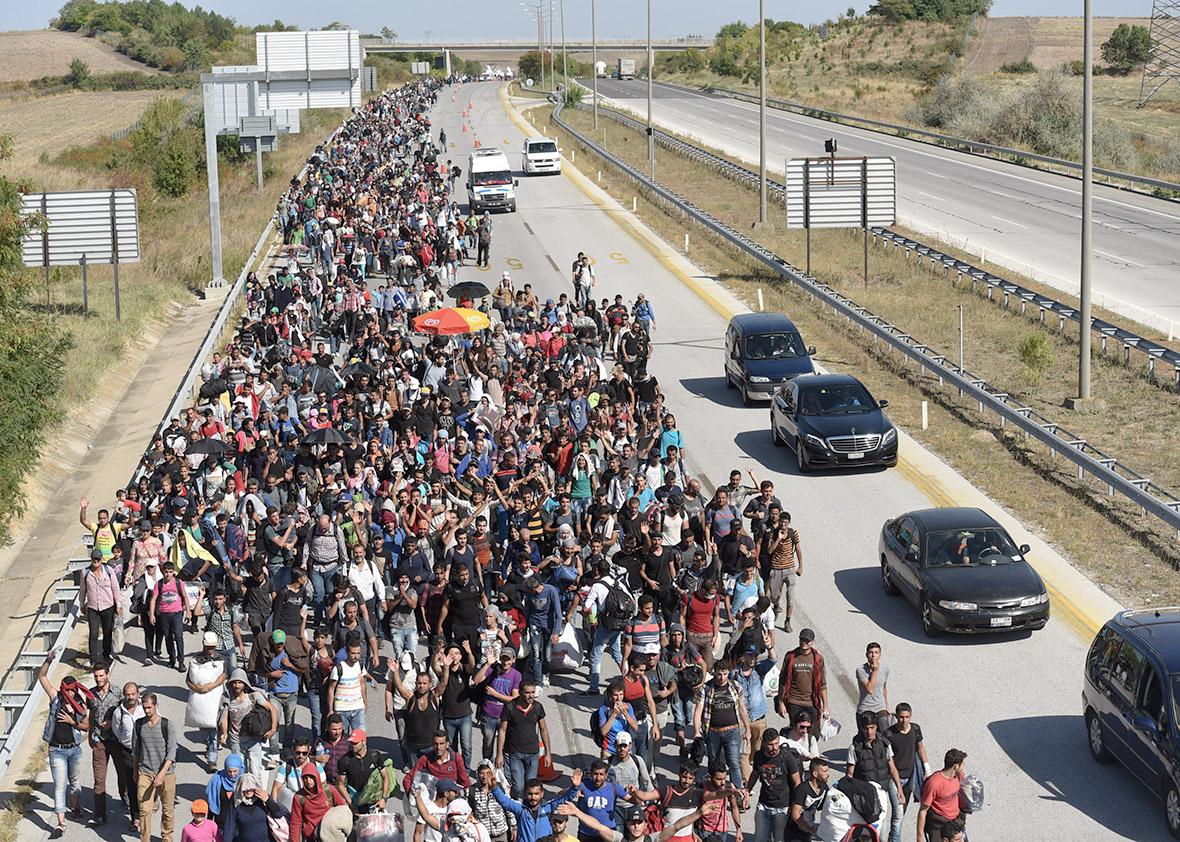BERLIN—Nobody can deny that she was brave, or that her sentiments were widely admired. When German Chancellor Angela Merkel declared in August that a Europe that failed on the question of Syrian refugees “won’t be the Europe we wished for,” the world applauded. When she announced she would unilaterally suspend the “Dublin rules,” Europe’s dysfunctional asylum system—in effect opening Germany to any Syrians who could get there—grateful refugees in Hungary began chanting her name.
Germans cheered too, and no wonder: Merkel’s gesture gave her countrymen an extraordinary psychological boost. Suddenly, Germany was seen around the world as a nation of tolerance and generosity. For many Germans this was a historic shift, proof that democracy really has succeeded in a country once better known for war and genocide.
Three months later, Germany is paying a heavy political price for that moment of glory and national redemption—and no one more so than Merkel. As many predicted, Merkel’s gesture immediately encouraged thousands more people to make the dangerous trip across the Mediterranean. Despite colder weather, some 250,000 refugees every month—8,000 per day—are now entering the European Union, desperate to get in while they still can, overwhelming refugee services in even the most generous countries. The death toll continues to rise. On Wednesday, 14 more people drowned in the sea between Turkey and Greece.
As a result of this influx, Europe’s Schengen treaty, which eliminates borders between those countries that are members, is under mortal threat. Sweden has reintroduced temporary checks at its border crossings, just to monitor the flow of people.
Slovenia and Hungary have put up fences on their borders with Croatia. A reasonable EU plan to distribute refugees among many countries isn’t working, because most refugees want to go to Berlin or Stockholm, not Tallinn or Bratislava. But even if they did want to go, the institutions to transport and house them don’t exist.
This legal and logistical crisis pales beside the looming political crisis. Across the continent, people are unsettled by the sense that Europe has lost control. There is talk of German hypocrisy: For years—decades, really—Germany positioned itself as the keeper of Europe’s rules. Whether dealing with the Greek crisis or the Russian invasion of Ukraine, Germany has always stuck solemnly to whatever treaties it signed or promises it made, even those made irrelevant by changing politics, such as Germany’s insistence on its old promise not to put military bases on NATO’s eastern border. When Germany suddenly changed the immigration rules and, without consultation at the European level, forced everyone else to accommodate, widespread disaffection began to spread.
Unless the sense of control returns, the political consequences could be severe. On both halves of the continent, people now fear a surge in support for far-right, anti-European, or anti-immigrant political groups. Many believe the refugee crisis will help the campaign to pull Britain out of the EU, simply because the crisis makes the EU look weak and disorganized. In Poland, where there are very few refugees the nationalist right has nevertheless just won an election during which the leader of the new ruling party warned against refugees carrying “vermin” and “diseases.” Viktor Orban, the Hungarian prime minister, consistently exploited the refugee crisis, creating hysteria precisely in order to present himself as a defender of Christian Europe—and strengthened his position by doing so. Far-right parties in France, Sweden, and the Netherlands are set to benefit. Last but not least, Merkel now has a serious challenge from within her own party: Her allies in Bavaria are threatening to send refugees to other parts of Germany unless the numbers fall. Her own finance minister has called her a “careless skier” who has triggered “an avalanche.”
In an uncharacteristically disorganized scramble, Germany has shifted its foreign policy dramatically, throwing its support behind the authoritarian Turkish government, hoping it can keep people from travelling. At a summit in Malta this week, European leaders agreed to spend more money in Turkey as well as Africa, in exchange for help in controlling the flow of migrants. This latter decision could have (and should have) been made two years ago. In November 2015, it’s far too little, far too late.
To preserve the freedom of movement within its borders, to prevent a wave of far-right governments from taking power—to preserve, in other words, the EU itself—Europe needs emergency measures. It must re-assert control over its outer borders, create refugee processing centers at entry points, patrol its coasts. Compassion is vital, the victims of Syria’s brutal war cannot be forgotten, and it may eventually be possible to resettle many of them inside the EU. But if Europe itself becomes dysfunctional, that will not happen, because Europe will be incapable of extending compassion to anyone else.
An updated version of this article was published after the Nov. 13 Paris attacks.
